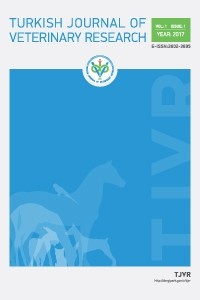Prevalence of Peste des Petits Ruminants in Goat at Upizalla Veterinary Hospital, Pirojpur Sadar, Bangladesh
Prevalence of Peste des Petits Ruminants in Goat at Upizalla Veterinary Hospital, Pirojpur Sadar, Bangladesh
Objective: The study was conducted to determine the prevalence of Peste des Petits Ruminants in different breed of goats based on age, sex, seasonal variation and vaccination status at Upazilla Veterinary Hospital, Pirojpur Sadar, Bangladesh during the period from January, 2015 to December, 2015.Materials and Methods: Total 319 cases of different breed of goats were recorded in which 43 (13.48%) were infected by Peste des Petits Ruminants. The diagnosis of Peste des Petits Ruminants was performed based on clinical history, clinical signs and some laboratory techniques. The major clinical signs were high fever, nasal discharge, rapid breathing, mouth lesions and bloody diarrhea. Results: The prevalence was highest in Black Bengal goat (6.90%) compare to Jamunapari (3.76%) and crossbreds (2.82%). Female goats were more susceptible (60.47%) than the male goats (39.53%). 5 months to 11 months aged goats showed highest prevalence (48.84%) followed by 1 to 3 years aged goats (27.91%) and 0 to 4 months aged goats (23.26%). In winter season, the prevalence was highest (55.81%) compare to summer (25.58%) and rainy season (18.60%). The non-vaccinated goats were more susceptible (90.91%) than the vaccinated goats (9.09%).Conclusion: Those prevalence of Peste des Petits Ruminants in different breed of goats based on age, sex, seasons and vaccination will help clinician to know the occurrence of Peste des Petits Ruminants in this area and will help them to take proper preventive measures.
Keywords:
Prevalence, Peste des Petits Ruminants, Upazilla Veterinary Hospital, goat,
___
- Akteruzzaman MMM, Hossain, SMA, Rahman A, Nahar A. Improvement of livelihood and food security through goat production in Bangladesh. Bangl J Ext Edu 2008; 20(1&2): 41-482.
- BER. Bangladesh Economic Review. Ministry of Finance. Bangladesh 20123.
- Blood AA, Afshar TW, Dukes AW, Becker A. Experimental PPR (goat plague) in goats and sheep. Canadian J. Vet. Res 1995; 52: 46-524.
- Chowdhury SA. Goat: our natural resources and development opportunities. In: Islam, M. R and Q. M. E. Huque (eds.). Proceeding of the workshop on poverty alleviation through goat production: national program. 27 April – 3 May, 2002. BLRI. Savar. Dhaka, 20025. FAO. FAO-AGRINATURA proposal on capacity development for agricultural innovation system (CDAIS) submitted to ERD, MOF, GOB, 20156.
- Gibbs EPJ, Taylor WP, Lawman MJP. Classification of peste des petits ruminants (PPR) virus as the fourth member of the genus Morbillivirus. Intervirology, 1979; 15: 35-417.
- Islam MR, Shamsuddin M, Das PM, Dewan ML.An outbreak of Peste Des petits Ruminants in Black Bengal goats in Mymensingh, Bangladesh. The Bangl Vet, 2001; 18: 14-19.8.
- Hoque MS, Samad MA. Present status of clinical diseases of goats in the urban areas in Dhaka. Bangl J Vet Med 1997; 31: 35-40.9.
- Rana, MAF. Goat rearing and management. Khamar (April, 2015). A monthly magazine on poultry, livestock and fisheries 2015; Pp 6-12.10.
- Rahman, MM, Hassan MZ, Sultana S, Uddin MK, Hossain,SMS. Incidence of Peste des Petits Ruminants in Rangpur sadar of Bangladesh. Asian J Med Biol Res 2017, 3 (4), 529-533; doi: 10.3329/ajmbr.v3i4.3534511.
- Sil BK. A brief introduction, its diagnosis and control, Peste des Petits Ruminants. The Bangl Vet, 2000; 18: 12-15.12.
- Samad MA. Poshu Palon O Chikitsavidya (Animal Husbandry and Medicine). 2nd edn., Published by M. Bulbul, BAU campus, Mymensingh, Bangladesh, 2001.
- Başlangıç: 2017
- Yayıncı: Ebubekir CEYLAN
Sayıdaki Diğer Makaleler
Sonnet PODDAR, Tuli DEY, Jabin SULTANA, Salma AKTER, Md. ALAUDDIN
The effect of thymoquinone on serum antioxidant vitamin levels in diabetic rats
Ayse USTA, Semiha DEDE, Ibrahim Hakki YORUK
Neslihan ORMANCI, Fatmagül YUR
A case of Neospora caninum infection in a dog
Duygu KAHRAMAN, Ebubekir CEYLAN
Tuli DEY, Sonnet PODDAR, Jabin SULTANA, Salma AKTER, Bibek Chandra SUTRADHAR
İsmail Hakkı EKIN, Sevil ATES, Gülşah TOLLU, Ozgul GULAYDIN, Kemal GURTURK, Ziya ILHAN, Cihat OZTURK
Squamous cell carcinoma at the tongue of a cat
Mehmet Kazim BORKU, Kadir SEVIM, Erfaneh PIRPANAHI, Pınar CAN, Ekrem Cagatay COLAKOGLU
Clinical and some laboratory findings in cats with Toxoplasmosis
